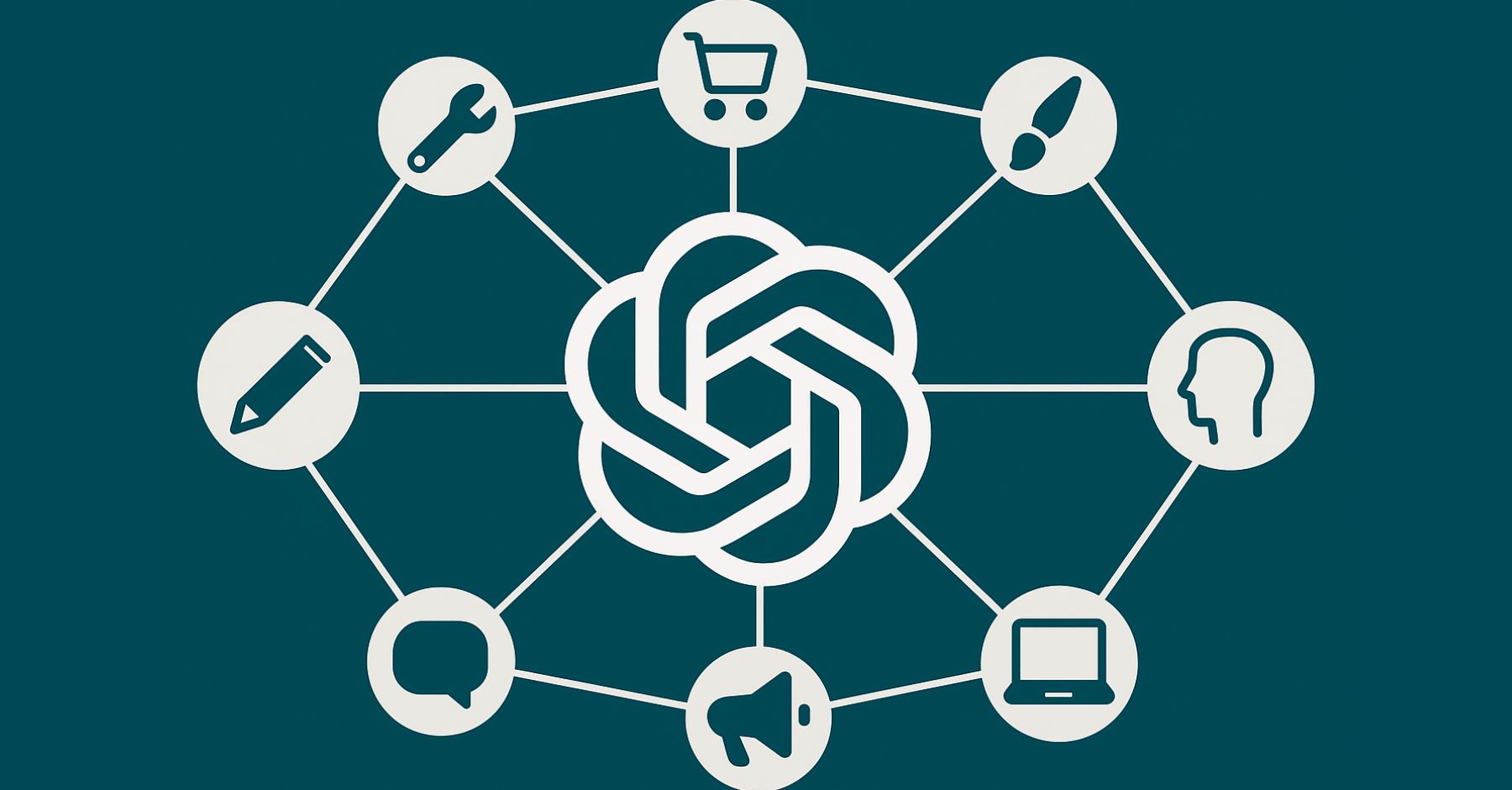Each week we’ll gather headlines and tips to keep you current with how generative AI affects PR and the world at large. If you have ideas on how to improve the newsletter, let us know!
What You Should Know
ChatGPT Is Now Its Own Ecosystem
At OpenAI’s Dev Day on Monday, CEO Sam Altman started with a look back to when ChatGPT first entered the scene in November 2022. It was then a novelty tool, an AI chatbot that could write sonnets and press releases, match voices, and answer questions from a months-old knowledge base.
Almost three years later, ChatGPT is fully connected to the internet and can create software, images, videos, and other content with very little input. It has more than 800 million weekly users, who have gone from tapping it for certain tasks to operating within it like an ecosystem.
Monday, Altman shared ChatGPT’s newest feature: applications within the platform. OpenAI is starting out with seven — Booking.com, Canva, Coursera, Expedia, Figma, Spotify, and Zillow — with 11 more joining by year’s end. He also teased an upcoming directory of apps, and said relevant apps will be suggested to users in certain situations.
The difference between this new app store and the GPT store that never quite took off is the potential for monetization. Add to this the instant checkout feature OpenAI announced last week, and you have a new channel that blends discovery, interaction, and transaction.
The same way websites, social platforms, and search engines once opened new paths for reaching audiences, AI ecosystems like ChatGPT are on track to become environments where people find and engage with companies directly. If consumers can plan trips, compare prices, and book airfare and hotels without leaving ChatGPT, brands will need to think about how they show up and operate within these platforms, not just on the open web.
Communicators need to focus on where and how their brands appear in AI search — which Semrush says has the potential to usurp traditional organic search by 2029 — as well as how they can interact with and help those searchers. What apps could you develop that could surface at exactly the right time to help a customer gather information and make a decision?
There’s a more direct path to a sale for a retailer that can hook onto OpenAI’s agentic commerce offering than it is for some B2B tech companies, but a new level of creativity and experimentation is now necessary.
When audiences start turning to AI assistants to research, vet, and buy what they need, the brands that already understand how to speak that language — conversationally, contextually, and authentically — will have a head start.
Elsewhere …
- LISTEN: More College Students Are Using AI for Class. Their Professors Aren’t Far Behind
- Tech Company Unveils AI-Generated Music Video Hosts
- Study Shows 93% of CMOs See ROI from GenAI
- Creating New Drug Delivery Techniques with AI
 Dealing with the sycophancy
Dealing with the sycophancy
What’s happening: Ever since GPT-5 was released, ChatGPT has reverted to a level of sycophancy that’s hard to reduce. After nearly every output, this model will say something like “Do you want me to…” or “If you want, I can…” often followed by something you don’t want. At all.
Don’t do this: One misconception on forums is that going into settings on the mobile app (it’s not on the desktop version) and turning off “Follow-up suggestions” in the suggestions section will stop the constant questions. Alas, it doesn’t.
Try this: You can tell ChatGPT to remember not to do this, or even manually add it to the “memory” list, but even that isn’t foolproof. The best bet may be to include the instruction in your first prompt. Keep something like this handy on a digital notepad or even a .txt file on your desktop:
“Do not offer unsolicited suggestions or add things I haven’t asked for at the end of outputs. Default to answer-only responses unless explicitly requested otherwise.”
One step further: Take even more sycophancy out of the equation by adding this to your first prompt: (h/t to Senior Staff Writer Zac Boyer for this one)
“Evaluate what I say independently. Don’t defer to what I just said. Be critical and identify weaknesses, gaps, or flaws — even if that contradicts my perspective. If something is clearly solid, give straightforward agreement. I do not mean to lead you toward a certain answer. I am just typing in a stream of consciousness.”
Quote of the Week
“We’re researching the intersection of AI, media and the online experience of citizens. We’re creating resources and tools for journalists and news consumers to better navigate it. And we can help philanthropic organizations pursue their missions when it comes to the intersection of AI and civil society.”
— Alex Mahadevan, Director of Poynter’s MediaWise Media Literacy Initiative, in a blog post about Poynter’s new AI Innovation Lab
How Was This Newsletter?



